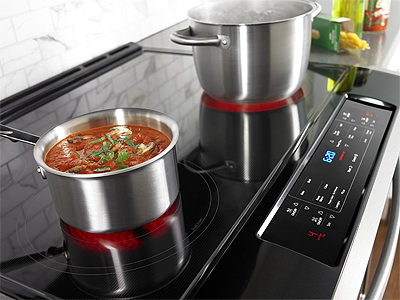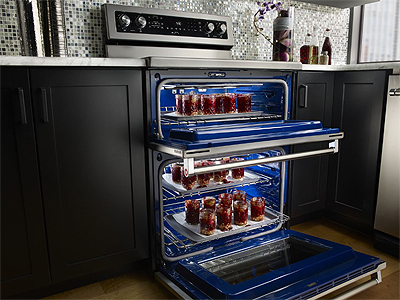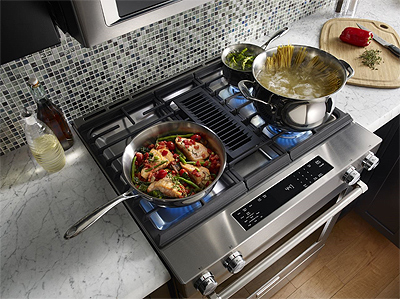
.png)
Search By Square Foot
• Up to 1000 Sq Ft
• 1001 - 1500 Sq Ft
• 1501 - 2000 Sq Ft
• 2001 - 2500 Sq Ft
• 2501 - 3000 Sq Ft
• 3001 - 3500 Sq Ft
• 3501 - 4000 Sq Ft
• 4001 - 4500 Sq Ft
• 4501 - 5000 Sq Ft
• 5001 Sq Ft And Up
Search By Square Foot
• Up to 1000 Sq Ft
• 1001 - 1500 Sq Ft
• 1501 - 2000 Sq Ft
• 2001 - 2500 Sq Ft
• 2501 - 3000 Sq Ft
• 3001 - 3500 Sq Ft
• 3501 - 4000 Sq Ft
• 4001 - 4500 Sq Ft
• 4501 - 5000 Sq Ft
• 5001 Sq Ft And Up
by Rachel Lyon, Editorial Director for The House Designers®
Outfitting a kitchen isn’t a simple undertaking. Choosing every feature is an act in balancing aesthetics, functionality, and the all-important budget. Of course, appliances are a major part of kitchen design, and the range is where most of the magic happens—make sure you find one that’ll work perfectly for your needs! While you’ll see all sorts of bells and whistles on large commercial-style appliances and separate cooktops and wall ovens, this article will cover the possibilities available in the humble range of typical size.

Fuel and Controls
The first thing you need to decide is whether you want an electric or gas range, or perhaps a dual fuel model with a gas cooktop and an electric oven. This often comes down to personal preference—some prefer the safety and higher energy efficiency of electricity (including induction) while others demand the instant and precise temperature control of gas—but location also plays a part. If your area doesn’t have a gas line to connect to, that makes the decision easy. Your budget might also have a say—electric appliances typically cost a bit more than gas, and gas is usually less expensive than electricity when it comes to paying utility bills. The exact numbers vary by markets, so make yourself an educated consumer before committing to the purchase.
Also be sure to think about controls. On ranges, you’ll find knobs, buttons, and sometimes even touchscreens these days. They can be located on the backguard behind the burners or at the front of the appliance, in front of the burners or on the forward face above the oven door. Gas ranges almost always have burner controls in front so you won’t ever have to reach across an open flame to adjust them, but they might still have the oven controls on the backguard. Electric ranges have controls in all of these places, depending on the model. So, consider your reach, and whether you have any young family members you don’t want reaching anything important, to decide where you’re most comfortable having controls.

Single or Double Oven
Luxury commercial-style ranges have offered double ovens for a while, and now that feature is becoming more available for everybody. The typical range is only about 46 inches tall by 30 inches wide by 28 inches deep, though—you might be wondering how to fit two ovens into that! The fact of the matter is, a lot of vertical space goes unfilled when using the oven; stacking two separate chambers allows you to more efficiently use that space, and it hardly ever affects functional capacity—you’ll still be able to fit a large roaster and most other things.
Double oven ranges cost more up front, but they could potentially save money in the long term. It takes a lot less energy to heat a smaller space, so if you’re only going to roast a single tray of vegetables, why heat up the full five cubic feet of the average single oven range? The increased cooking flexibility is what primarily appeals to most homeowners, however. When the ovens can be set to different temperatures, more tasks can be tackled at once.
What does a single oven range have to offer, then? Well, it can actually be better in some cases! For instance, double ovens remove the drawer typically found at the bottom of the appliance, which, depending on what you’re used to, cuts the usual storage or warming/broiling space. If you have trouble bending over, this could also pose a problem because it lowers the height of the larger oven, thereby reducing its useful capacity for you. As with anything, we have options for a reason, and it’s up to consumers to decide what works best for their situations.

Built-in Features
Finally, we get to those bells and whistles that have trickled down into more affordable territory! There’s a lot more variety in ranges than there used to be—it’s becoming common to find things like smart technology, integrated downdraft ventilation, and specialty burners designed to work with griddles (like this center oval burner) that widen the possibilities. Take a look at some ranges and you will probably notice specialty features you’ve never seen before. We’ve seen particular interest in connected kitchen appliances, so for more on that hot topic, check out our article, Smart Home Appliances for Modern Households. Keep in mind that technology is always changing, and smart ranges are designed to update with it so you don’t miss out on functionality that rolls out later!
If you’re in the market for a new range, Whirlpool® and KitchenAid® have plenty to explore across different price points! These are not the appliances you’ve known for years—they have so much more to offer than you’re used to. And if you’re interested in luxury ranges, JennAir® offers a number, including slide-in and professional-style models in the standard 30-inch width. There’s never been a better time to get exactly what you want in a range!